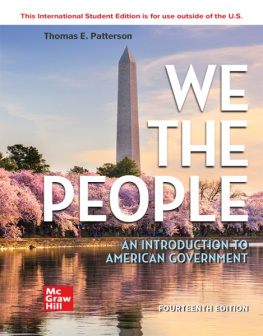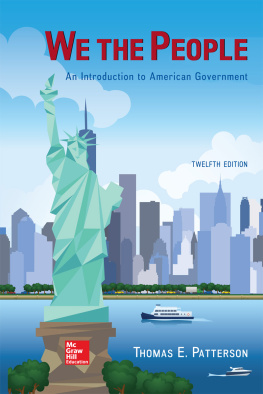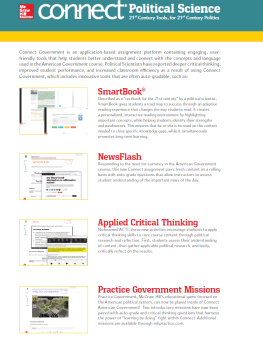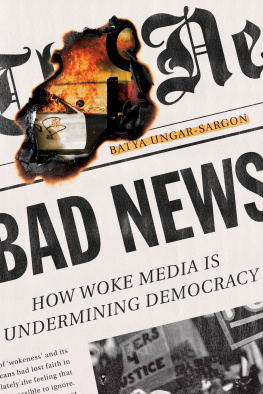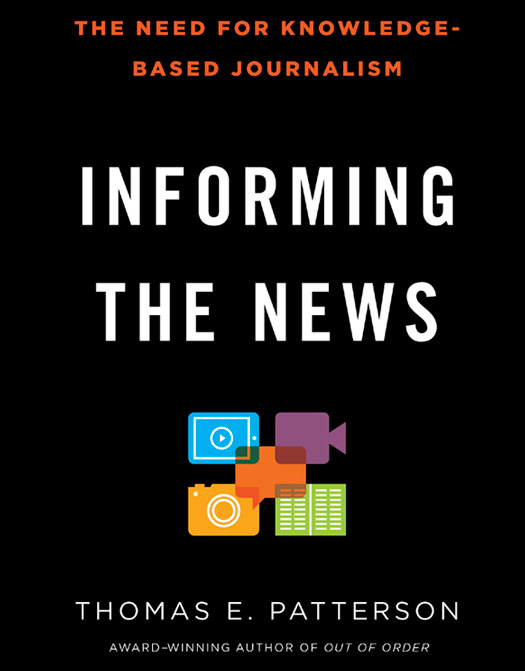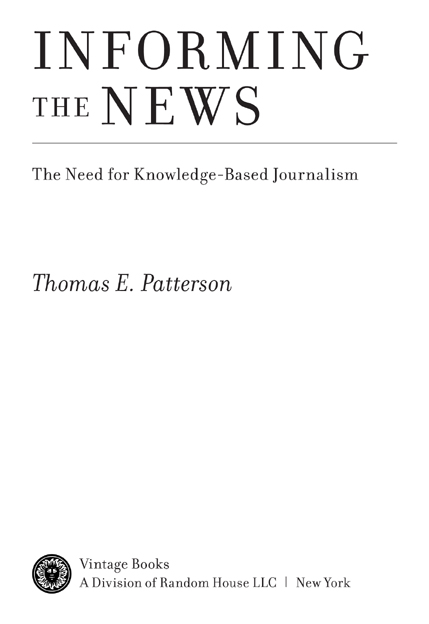Thomas E. Patterson is Bradlee Professor of Government and the Press and teaches at the Joan Shorenstein Center on the Press, Politics and Public Policy at Harvard Universitys John F. Kennedy School of Government. His book The Vanishing Voter looks at the causes and consequences of electoral participation. His earlier book on the medias political role, Out of Order, received the American Political Science Associations Graber Award as the best book of the decade in political communication. His first book, The Unseeing Eye, was named by the American Association for Public Opinion Research as one of the fifty most influential books on public opinion in the past half century. His research has been funded by the Ford, Markle, Smith Richardson, Pew, Knight, Carnegie, and National Science foundations.
ALSO BY THOMAS E. PATTERSON
The Unseeing Eye
Out of Order
The Vanishing Voter:
Public Involvement in an Age of Uncertainty
A VINTAGE ORIGINAL, OCTOBER 2013
Copyright 2013 by Thomas E. Patterson
All rights reserved. Published in the United States by Vintage Books, a division of Random House LLC, New York, and in Canada by Random House of Canada Limited, Toronto, Penguin Random House Companies.
Vintage and colophon are registered trademarks of Random House LLC.
Library of Congress Cataloging-in-Publication Data:
Patterson, Thomas E.
Informing the news: the need for knowledge-based journalism / by Thomas E. Patterson.
pages cm
eBook ISBN: 978-034-58066-1
ISBN 978-0-345-80660-4 (pbk.)
1. JournalismStudy and teachingUnited States. I. Title.
PN4788.P38 2013 070.4071dc23 2013009242
Cover design by Heather Kelly
www.vintagebooks.com
v3.1
FOR LORIE
In an exact sense the present crisis in Western democracy is a crisis in journalism.
Walter Lippmann,
Liberty and the News, 1920
CONTENTS
INTRODUCTION
The Corruption of Information
ONE
The Information Problem
TWO
The Source Problem
THREE
The Knowledge Problem
FOUR
The Education Problem
FIVE
The Audience Problem
SIX
The Democracy Problem
ACKNOWLEDGMENTS
Journalists cannot meet democracys needs unless they become knowledge professionals who have mastery not only of technique but also of content. This idea, put forth by Dr. Vartan Gregorian, president of the Carnegie Corporation of New York, marked the beginning of the Carnegie-Knight Initiative, from which this book stems.
Vartans vision caught the attention of Hodding Carter III, the president and CEO of the John S. and James L. Knight Foundation. In 2005, they announced the Carnegie-Knight Initiative for the purpose of strengthening journalism education and practice. Journalism education was the starting point. Four top journalism schoolsthose at Columbia, Northwestern, the University of CaliforniaBerkeley, and the University of Southern California, as well as Harvard Universitys Shorenstein Center on the Press, Politics and Public Policywere asked to rethink how journalism students were being trained. Two years later, the journalism programs at Arizona State, Maryland, Missouri, Nebraska, North Carolina, Syracuse, and Texas were added to the initiative. These twelve institutions spent much of the past decade developing ways to bring knowledge more fully into journalism training.
This book focuses more on journalism practice than on journalism education. Nevertheless, my participation in the initiative and belief in its goals are what led to the writing of this book. Special thanks are due to Vartan Gregorian and to Alberto Ibargen, who succeeded Hodding Carter as Knights president and CEO shortly after the initiative started. Vartan and Alberto did more than put institutional funds into the initiative. They put their energy and ideas into it. So did Susan King, Carnegies vice president of external affairs, and Eric Newton, Knights vice president for the journalism program. Without Susans and Erics steady influence, the initiative would have had much less power and direction. Carnegies Ambika Kapur helped all of us, foundation officers and scholars alike, by organizing the initiatives activities.
I also want to thank all those who served as dean at the participating institutions during the six years of the Carnegie-Knight Initiative: Chris Callahan of Arizona State University; Orville Schell and Neil Henry of the University of CaliforniaBerkeley; Nicholas Lemann of Columbia University; Tom Kunkel and Kevin Klose of the University of Maryland; Dean Mills of the University of MissouriColumbia; Gary Kebbel and Will Norton of the University of Nebraska; Loren Ghiglione and John Lavine of Northwestern University; David Rubin and Lorraine Branham of Syracuse University; Jean Folkerts and Susan King of the University of North Carolina at Chapel Hill; Geoffrey Cowan and Ernest Wilson of the University of Southern California; and Roderick Hart of the University of Texas at Austin. Their insights on journalism influenced my thinking on the subject, although Im sure they would take exception to someperhaps manyof the arguments put forth in this book.
Thanks also to Alex Jones, my colleague at the Shorenstein Center, who is the centers director and served from the start as coordinator of the initiatives task force, which had the lead role on research and policy issues. Alexs contribution goes beyond his service to the initiative. His friendship and advice are treasured, in my personal as well as professional life. The Shorenstein Centers Nancy Palmer protected my writing time and was my constant reader. I knew a chapter was nearing completion when she returned it with only a suggestion or two. For the final draft, the centers John Wihbey weighed in. Kristina Mastropasqua of the center was my research assistant, as were graduate students Will Cole, Melissa Galvez, and Hanna Siegel. They did the work cheerfully, and well.
If the activities of the Carnegie-Knight Initiative are the source of the book, the century-old writings of journalist Walter Lippmann have been its guide. I have tried to honor Lippmanns contribution by citing him regularly, by consciously modeling some of my arguments after his, by starting each chapter with a quote from his writings, and by adopting Lippmanns signature use of numbers to head chapter sections.
The largest group that could have been acknowledged is the hundreds of scholars and journalists whose work informed my analysis. Their identities are revealed in the books footnotes. Their contributions bolster my claim that journalism can and should become a knowledge-based profession.
The shortest list in these acknowledgments consists of one individual, my wife, Lorie Conway. I owe her my heartfelt thanks. The weekends and evenings I spent hunched over the keyboard imposed unreasonably on our time together. The fact that she is a journalist by training and a former Nieman Fellow at Harvard might explain her patience. I know better. Her support was unconditional, and her suggestions helped me unravel the many puzzles that arose while developing the case for knowledge-based journalism. The preparation of the book would not have been anywhere near as manageable or as enjoyable without her at my side.


